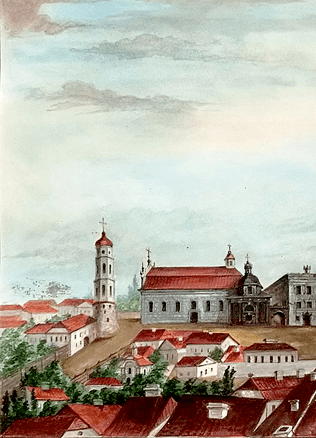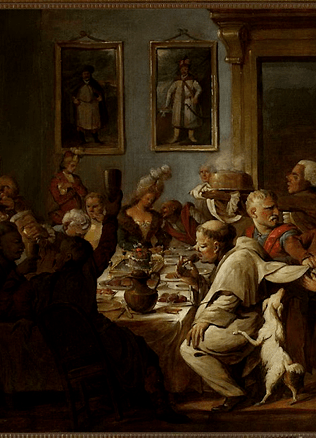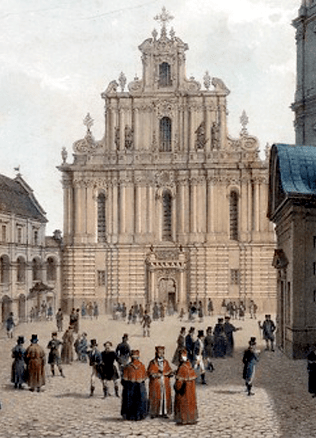Life of the Degraded Noblemen
The noble estate enjoyed the most important position in the social hierarchy of the Grand Duchy of Lithuania. The nobility, however, was far from homogenous. It consisted of aristocrats, (the magnates), as well as of middling and petty nobles who owned little to no land respectively. The importance and financial might of noble families and even particular individuals was constantly fluctuating. Many families went through a process of ascend and subsequent slide down or even oblivion. A considerable number of the noblemen were utterly poor. They sometimes could hardly afford their daily meals yet they still enjoyed all the privileges of the estate. Some of them – mostly vagabonds – would eventually cross the line and lose their symbols of the nobility. They would live on accidental income, sometimes illegal, and would very often end up in prisons or on the scaffold. Surviving interrogation documents reveal the paths that led them into the world of crime. What kind of life it was?
Stories of anomie
Many representatives of the nobility would end up in prison cells because of regular thefts. The 1736 interrogation records tell the story of Józef Majewski, a nobleman from the palatinate of Płock in Poland. He told the interrogators about his long trip across the whole country. He visited Lublin and Vilnius where he worked as a castle watchman and eventually became a criminal. Someone noticed his theft when he played cards with a Jew.
Jan Antony Kondracki, another destitute noble, was also charged with theft in 1741. According to the interrogation documents, he was born in the Ashmyany district where he worked for a while. He stole items already stolen from Kazimierz Tumilowicz. In the capital city of Vilnius he discovered a warehouse containing various items in one of the streets and broke into it together with a shoemaker named Szymon. He later learned that Tumilowicz had been robbed but kept silent. According to the defendant, he did not speak about the stolen items with anybody except his wife and housemaid. He later started selling the stolen items to Jews. The end of this particular story is unclear but many of them would definitely bear a sour final.
Ignacy Osędowski’s road to the scaffold
Ignacy Osędowski, a 28-year-old son of the treasurer of Pärnu district, appeared was interrogated in 1756 under the guard of the members of the Vilnius castle garrison. He was born into the family of the nobility in what was then a palatinate of Livonia. He finished a school in Daugavpils before starting work for the Livonian podkomorzy (the land border dispute judge) Jan Andrzej Józef Borch at the age of 16. He later moved to Vilnius together with Borch but soon returned to his native Livonia where he was subsequently involved in “nefarious acts”, mostly robbing people on the road to Riga. Together with several peasants and Józef Czwieczkowski, a manager of the Dembinov estate in the palatinate of Livonia, he robbed merchants from Russia on the road to Riga and stole seven carts full of flax, which he then took to his father’s house. He eventually returned the carts to the merchants after his neighbour Antony Korn warned him about rough consequences. Feeling angry about his neighbour, he stole two horses and fled to Courland together with four peasants, two men and two women. Later he had intimate relationship with the two women before abandoning them, selling the horses and returning home once again. Father forgave the prodigal son, yet he did not change his behaviour. Ignacy began robbing neighbours again and shot Korn during one of his assaults. Realising that Livonia no longer was a safe place for him, he fled to Courland again where he spent several weeks in his uncle’s home. He later stayed at the Dominican monastery in the village of Pasienė, in the present-day Latvia, for half a year before moving to the monastery of Holy Spirit in Vilnius and another Dominican monastery in the village of Paparčiai. Although he was married, he continued to roam around Vilnius, Trakai and Švenčionys stealing horses, robbing and cheating. He was arrested in Vilnius where the castle court ultimately issued a death sentence against him.
Despite all of his sins, the court granted him the last privilege that the nobility enjoyed. He was beheaded, the sentence considered honourable to any nobleman.
An ignoble death
While some were “fortunate” to be beheaded, other nobles faced less honourable punishments.
Józef Sawicki, an impoverished nobleman from the region of Alšėnai, was brought to jail inside the Vilnius Castle in 1738 for robbing a shop run by two Vilnius Jews, Leyser Klaschka and his wife Khaya where he stole cash, valuables, fabrics and garments. His noble background proved no salvage in his case. He was sentenced to death by hanging according to the chapter 14, article 7 of the Lithuanian Statute.
Benedykt Radziewicz-Radziejewski, another nobleman from Vilnius, was found guilty and named a dangerous criminal in 1740 for breaking into the house of a canon Krzysztof Białłozor in Vilnius and an attempt to strangle him. He was hanged according to the chapter 14 article 14 of the Lithuanian Statute. He received a more severe punishment because he confessed of taking part in other burglaries; Franciszek Horowski, a co-offender, was whipped in public and banished from the city because he was new in the world of crime.
Michał Tupalski received a death sentence in 1758. According to documents of his interrogation, he was a horseman of the Confederation of the Grand Duchy of Lithuania captured by Russian soldiers under major Ozięblowski who invaded the country in 1733 together with the Russian army to support King Augustus III in his fight against the group of supporters of Stanisław Leszczyński that lasted until 1736. After serving his prison sentence, Tupalski was free but jobless and only occasionally he would work as a mercenary. Later he became acquainted with several men and took part in robberies together with them. Despite his noble background, the court sentenced all him to death by burning together with his other accomplices.
Different causes, including personal characteristics, social environment and friends, were behind the degradation of the representatives of the nobility. They would suffer greatly during wars as well. Homeless noblemen would become criminals.
Domininkas Burba



